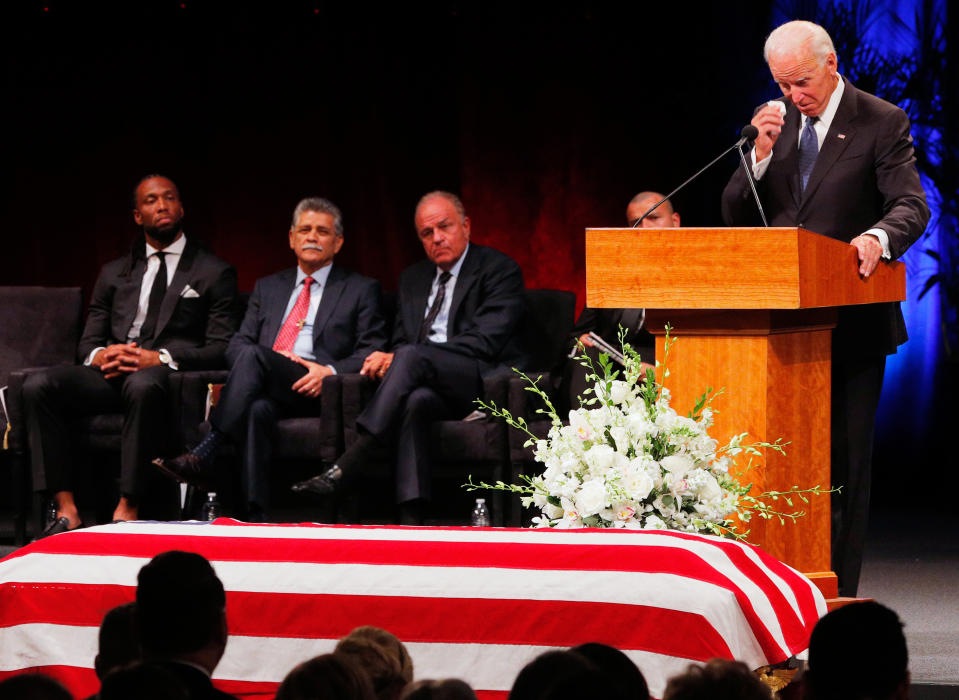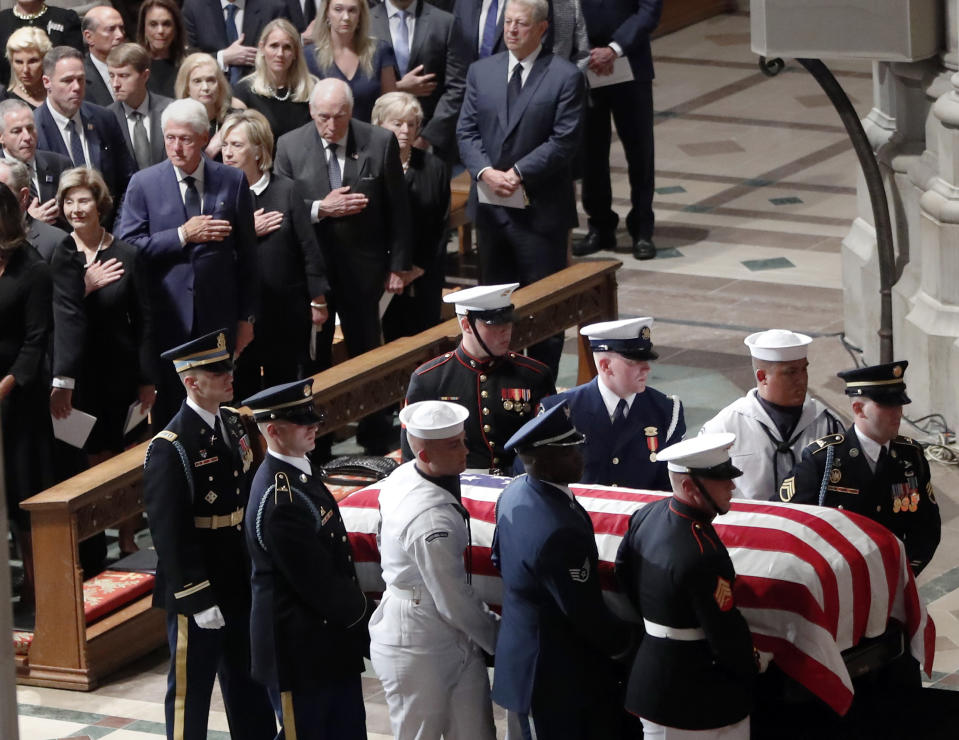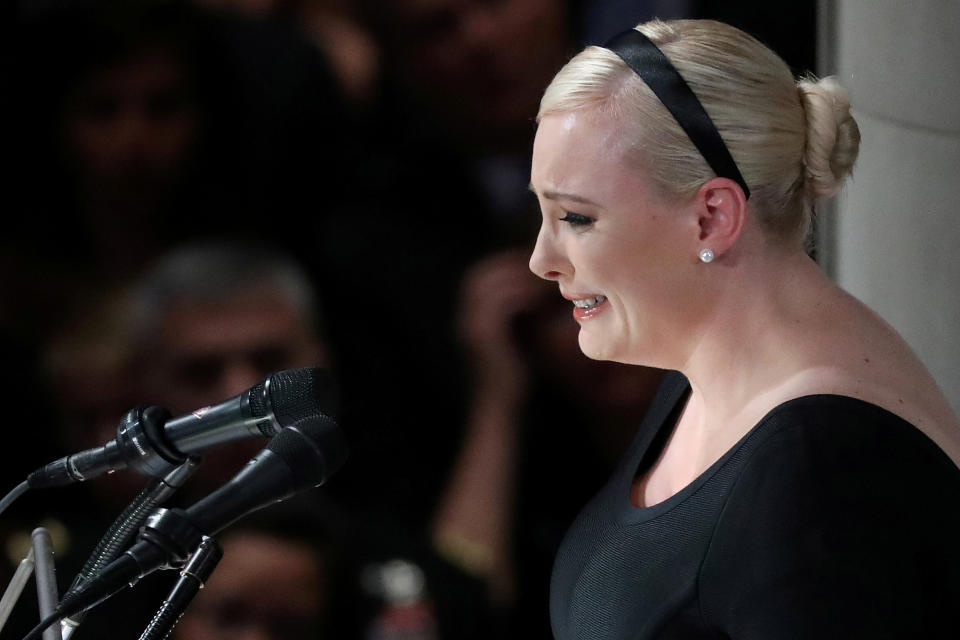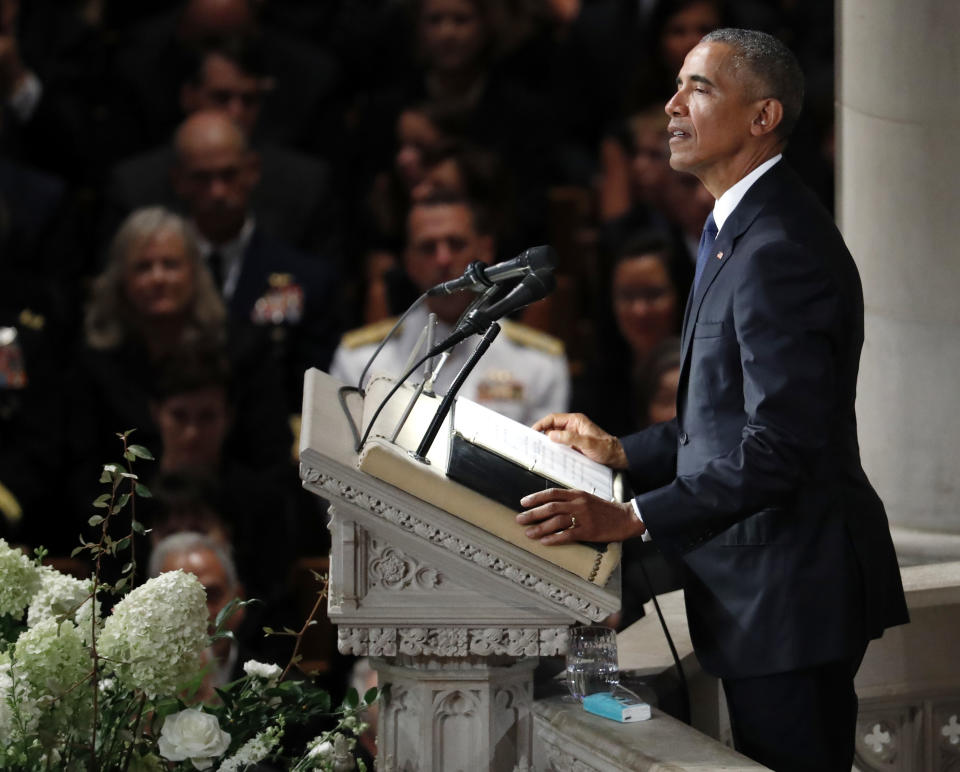At National Cathedral, former presidents pay homage as McCain takes his place in history

For 35 years, John McCain made the trip between Phoenix and Washington, across the desert and the plains, the factory towns of the Midwest. Finally, there was the Pentagon, sitting squat on the west bank of the Potomac, home to the generals who had sent McCain to fight in Vietnam. He was on the other side of the river, coming to Washington as a U.S. representative in 1983, then moving to the other side of the Capitol, as a U.S. senator, in 1987. He remained a senator for 31 years, until his death this week from brain cancer.
McCain took his final journey from Phoenix to Washington on Thursday, in a coffin draped with the American flag. There had been a service at the North Phoenix Baptist Church that had been a testimony to the fullness of his life, both in Washington and Arizona. The speakers included former Vice President Joe Biden, who is a Democrat and a longtime friend, and Arizona Cardinals wide receiver Larry Fitzgerald.
Slideshow: Memorial tributes to John McCain >>>
“Senator McCain, it has been a true honor to call you friend,” Fitzgerald said. Biden, who had lost his own son to the same form of brain cancer that had taken McCain, cried, as the late senator’s 106-year-old mother, Roberta McCain, looked on. Then everyone went out into the merciless Arizona sun as John McCain prepared to fly back East one last time.

On Friday, McCain lay in state in the rotunda of the U.S. Capitol, an honor that had been afforded to just 30 other Americans in history. As dignitaries foreign and domestic began to fill the chamber, Sen. Patrick Leahy approached the catafalque, or pedestal, on which McCain’s coffin would sit both during the service and the public viewing that was to follow. The 78-year-old Democrat from Vermont placed his right hand on the black cloth covering the same pine slats that supported the coffin of Abraham Lincoln.
Aside from clergy, the only speakers at Friday’s ceremony in the rotunda were fellow Republicans. And there was not, in their words carefully crafted by speechwriters, any of the radiant warmth that had been evident the day before in Arizona. That’s because McCain’s legacy as a member of his own party remains complex, after his last significant act as a legislator, the dramatic late-night, Senate-floor thumbs-down gesture that helped sink the Republican replacement for the Affordable Care Act like the slapped-together raft that it was. And to the end, he remained an unsparing critic of Donald Trump, even as other Republicans learned to deal with questions from reporters about the president’s comportment by simply walking away. McCain, who had been tortured by the North Vietnamese, was not frightened by reporters, and he was not frightened by tweets. But he knew that America was in a frightening moment, and he was not afraid to say so.

“I will miss a dear friend,” said Senate Majority Leader Mitch McConnell. Days before, Senate Minority Leader Chuck Schumer, D-N.Y., had proposed changing the name of the Russell Senate Office Building to honor McCain — substituting a (sometimes maverick) Republican for a (segregationist) Democrat, Richard Russell of Georgia. Google Maps complied almost instantly (if temporarily), but Washington does not move quite as quickly as Silicon Valley, and McConnell is well aware of Trump’s disdain for McCain. Though Democrats and Republicans both support the effort, it has been condemned to needless deliberation by McConnell. The Kentuckian’s effusive praise of McCain’s vision of, and for, America was not especially convincing. It was evident that none of the McCain family and friends seated behind the phlegmatic majority leader seemed especially moved.
At least some laughed when House Speaker Paul Ryan, R-Wis., noted that McCain had once been “a man of the House.” This is true. But he was truly, above all, a man of the uniform. He was not, like McConnell and Ryan, a creature of the political establishment. He was as ambitious as they were, probably more so, but the ambition was not its own end. The years in the Hanoi Hilton, the regular beatings that mangled his body, made sure that he would never forget what he was fighting for.
Slideshow: John McCain: A life in pictures >>>
Sometimes, the fight was marked by erratic swings, as when he voted in 1983 against establishing a holiday honoring Martin Luther King Jr., or his involvement in a campaign-finance scandal six years later, which labeled him as one of the “Keating Five.” His selection of Alaska Gov. Sarah Palin as his running mate in 2008 paved the way for the crass, grievance-driven, anti-intellectual approach to politics that Trump now embodies. It would have likely happened anyway, but Palin’s selection helped it greatly.

But more often, he fought for things worth fighting for. McCain-Feingold, as the Bipartisan Campaign Reform Act of 2002 is known, attempted to curb the influence of money in politics. And he strongly condemned the use of torture in prosecution of the global war on terror. A classic Reagan-era Republican, he thought that the United States should be a force for good abroad and condemn human rights abuses wherever they occurred.
The last of the Republicans to speak was Vice President Mike Pence. As he did, McCain’s daughter Meghan McCain, 33, held hands with the senator’s mother, 106, the two women sitting side by side behind Pence. The poignant gesture had nothing to do with Pence, who delivered a wooden eulogy and managed to evoke a GOP talking point about “limited government.” It went unmentioned — though perhaps not forgotten — that Pence had voted against McCain-Feingold. More broadly, his Christian-branded Republicanism has little relation to what McCain, or for that matter Reagan, stood for.
What Pence was probably thinking was that McCain had been a pain in the butt. That he had been stubborn, quick to anger and prone to deciding things for himself instead of following party discipline. This is well known, as are the feelings of Pence’s boss about the late senator. Yet a democracy cannot function without pains in the butt, independent thinkers who follow their conscience. The opposite is an apparatchik, the loyal functionary who will do as the party leaders say. Pence had been precisely such a functionary, an unoriginal ideologue, lacking any inclination to principled defiance. For this, he had been rewarded with the vice presidency. McCain, meanwhile, had gone his own way, twice taking the Straight Talk Express (the nickname for his campaign bus) nearly — but not quite — to 1600 Pennsylvania Ave.

The next morning, Saturday, men who did get to the White House — former presidents Barack Obama, George W. Bush and Bill Clinton — sat with their spouses in the front pews of Washington National Cathedral for a funeral service that brought together dignitaries from both parties, as well as dignitaries dating to the Nixon administration, including Vietnam-era national security adviser Henry Kissinger, who sat behind the former presidents, solemn and stooped.
They watched as pallbearers carried McCain’s flag-draped coffin to the front of the nave. The coffin was carried by men who shared McCain’s vision, including former New York City Mayor Michael Bloomberg and Sen. Rob Portman, the moderate Republican from Ohio. There were also Warren Beatty, the actor, and Russian dissident Vladimir Kara-Murza, twice the victim of attempted poisonings for his opposition to the Kremlin, whose presence was an unmistakable rebuke to a president who yearns for approval from Russian leader Vladimir Putin.
Meghan McCain spoke for the first time since her father’s death, letting loose a powerful show of words and emotion. There was grief, of course, but also anger at the state of the country that McCain was leaving behind and pride in the man who she said was, above all, an exemplary father.
“We come here to mourn the passing of American greatness,” she said, in one of her several digs at the Trump administration, with Jared Kushner and Ivanka Trump sitting only yards away. “The America of John McCain does not need to be made great again, because America was always great,” McCain said with unfeigned vehemence, leading to an unlikely outburst of applause. Her condemnation of “cheap rhetoric from men who will never come near the sacrifice” of her father was another obvious allusion to Donald Trump, who had belittled McCain’s experiences during five years of captivity in a North Vietnamese prison camp.

But McCain also told the story of falling off a horse as a young girl. Her father picked her up and rushed her to the doctor. But after she had received the proper medical attention, he made her get back on the horse again. This was a daughter’s admiration for her father, for the confidence he instilled in her. Her father, she added, was known for his courage, but he was “defined by love.”
Two of the men who defeated John McCain for the presidency — Bush in 2000 and Obama 2008 —offered tributes of their own. Bush referenced the “hard-fought political history,” a euphemism for the 2000 presidential campaign. Bush had halted McCain’s momentum in South Carolina with a brutal and personal attack.
Speaking next, Obama said that McCain made him and Bush “better presidents. Just as he made the Senate better. Just as he made the country better.” He even suggested that McCain was now immensely enjoying the sight of two of his former rivals paying tribute to him. That allowed, just minutes after an outburst of applause, for another funereal rarity: laughter.
Obama evoked McCain’s decency in his response to a voter who referred to the Democratic candidate as “an Arab.” McCain forcefully, but patiently, explained that he was not.
“I was grateful,” Obama said, “but I wasn’t surprised.” Similar insinuations about Obama’s place of birth marked the political rise of Trump. It would have been unseemly to mention him here, but by praising McCain’s “largeness of spirit” and “disdain for self-pity,” he drew a contrast with a president whose personality is defined by the assiduous defense of a monstrous, monstrously fragile ego.

Trump spent the morning in the White House. Before the memorial service began, he was tweeting about a Fox News segment about the Russia investigation, the point of the segment being that nothing was Trump’s fault, nothing at all. Later, during the funeral service, as he was heading to play golf, Trump tweeted about trade with Canada.
About McCain, there was not a word.
Read more from Yahoo News:



